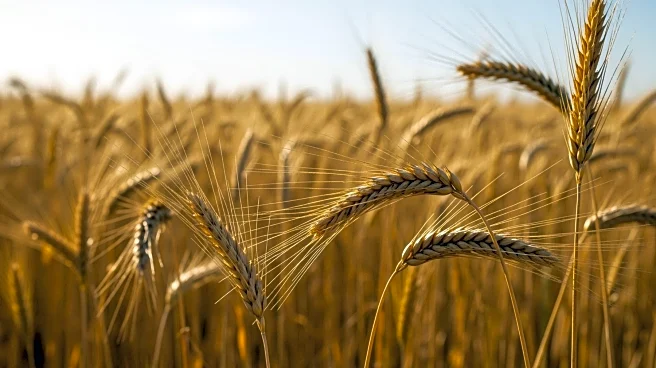What's Happening?
The Buenos Aires grains exchange has issued a warning regarding a potential cold front expected to hit Argentina's agricultural regions next week. This weather event could adversely affect wheat yields
for the 2025/26 season. The exchange currently forecasts a harvest of 22 million metric tons, which would make this season's crop the second-largest in Argentina's history if the prediction holds true. Argentina is a major global supplier of wheat, and the timing of the cold snap is critical as it coincides with the crop's crucial growth stages. Farmers in Argentina are scheduled to harvest their wheat fields from November through January. Additionally, corn farmers have planted 29.9% of the estimated crop area, with a maintained prediction of a 61 million-ton harvest.
Why It's Important?
The potential impact of the cold snap on Argentina's wheat crop is significant due to the country's role as a leading global wheat supplier. A reduction in yield could affect international wheat markets, potentially leading to price fluctuations and supply chain disruptions. This situation underscores the vulnerability of agricultural production to weather events, which can have far-reaching consequences for food security and economic stability. The exchange's warning highlights the importance of monitoring weather patterns and their effects on crop yields, which are crucial for planning and decision-making in the agricultural sector.
What's Next?
Farmers and stakeholders in Argentina's agricultural sector will be closely monitoring weather forecasts to assess the intensity and distribution of the cold front. Depending on the severity of the weather event, there may be adjustments in harvesting strategies or crop management practices to mitigate potential losses. The international market will also be watching developments closely, as changes in Argentina's wheat output could influence global supply and demand dynamics. Further updates from the Buenos Aires grains exchange are expected as the situation unfolds.
Beyond the Headlines
This event highlights the broader challenges faced by agricultural sectors worldwide in adapting to climate variability and extreme weather conditions. It underscores the need for investment in resilient agricultural practices and technologies that can help mitigate the impacts of such events. The situation also raises questions about the long-term sustainability of current agricultural practices in the face of changing climate patterns.









